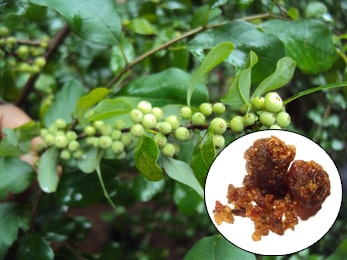Guggul (Commiphora wightii) - Properties, Benefits & Dosage

Description of Plant
Commiphora wightii is known with a name, Guggulu or Indian bdellium. It belongs to Burseraceae family that contain both trees and shrubs. This is a kind of small tree, grows up to 6 m with spiral, brown colored ascending branches ending in sharp scented spines. This plant has shiny, yellowish white barks that comes off in rough scales exposing under bark of green color. This under bark also seals off in the form of papery rolls. Guggul is the name given to a yellow color resin produced by its stem. Plant leaves are of small shape with quadrilateral, vessel like structure, present one to three in number. These plants have shiny green on the top, leathery and greyish below with irregular edges. Flowers are unisexual, small, of brown red color, sessile with oblong-ovoid ovary. These can present either in group of two to three or single. Fruits of these plants are of ovoid shape, reddish colored with six to eight mm in diameter. Seeds contain an under developed embryo. Their generic name is derived from Greek word kommis and phora which means gum bearer.
General Description
Commiphora wightii, called Guggulu in Sanskrit. In Sanskrit guggulu means one that protects against diseases. Guggulu controls vata mainly, helps to enhance warmth, digestion, reproductive and circulatory mechanisms. Guggulu also shows its effect to manage vata - the nervous system control and kapha - the fluids system control to some extent. So this plant can control and helps in balancing all three doshas. This is the one of the most important herbal tonic of Ayurveda, known as warm, dry, pungent-flavored, and aromatic with nutritive, lubricant, stimulant and digestion-enhancing properties.
Guggulu is very important for removing Ama from the body. Ama, a toxic substance, produced due to result of sluggish digestion and circulation. This is due to slow metabolism. The herb is known to control rheumatic and arthritic pain specially and in addition manage the sluggish liver, malaria, nervous diseases, cardiac and circulatory problems, weak digestion, various skin diseases like acne, leucorrhea, sterility, fractures, gynecological problems, impotence, sexually transmitted diseases and psoriasis.
It contains important constituents that are used to treat diseases. These are resin, essential oil, gugulipid, guggulsterones, myrrhanol and alpha-camphorene.
Classification of Guggulu
- Kingdom: Plantae
- Subkingdom: Tracheobionta
- Division: Magnoliophyta
- Class: Spermatopsida
- Subclass: Magnoliidae
- Order: Sapindales
- Family: Burseraceae
- Genus: Commiphora
- Species: wightii
Habitat
The Commiphora wightii or Guggulu is distributed in the rocky tracts of Gujarat, Rajasthan and Mysore in India. Sindh and Baluchistan of Pakistan. Earlier this plant grew abundant in Gujarat and Rajasthan but now days mainly develop in kachchh and saurashtra regions of Gujarat.
Names
- Latin name - Commiphora wightii
- English name - Indian bedellium
- Sanskrit name - Gugglu
- Urdu name - Muqil
- Hindi name - Guggul
- Gujarati name - Gugal or gugar
- Kashmiri name - Guggul dhoop
- Bengali - Guggula
- Malayalam - Gulgulu
- Tamil name - Mahisaksi guggalu
- Telugu - Guggipannu
- Kannada - Kanthagana
- Oriya name - Guggulu
- Chinese name - Mo yao
- Nepali name - Gokuladhoopa
- Arabic - Mogla
Ayurvedic properties
| Hindi / Sanskrit | English | ||
| Rasa | Tikta, Katu | Taste | Bitter, Pungent |
| Guna | Ruksham, Laghu | Physical Property | Dry, Light |
| Virya | Ushna | Potency | Hot |
| Vipaka | Katu | Metabolic Property (After Digestion) | Pungent |
Effects on Doshas
Guggulu herb balances all three Doshas: Vata, Pitta and Kapha.
| Charak Samhita | Sushrut Samhita | Vagbhata |
Sanjnasthapana - (Restores senses) |
Eladi |
Eladi |

The information presented on this website is solely intended for educational purposes and should not be considered a replacement for professional medical advice, diagnosis, or treatment. The statements and details on this site have not been assessed by the Food and Drug Administration. Our herbal products are entirely natural, pure, vegetarian, and efficacious. Individual results may differ, and it is advisable to consult with your healthcare professionals before using these products.
